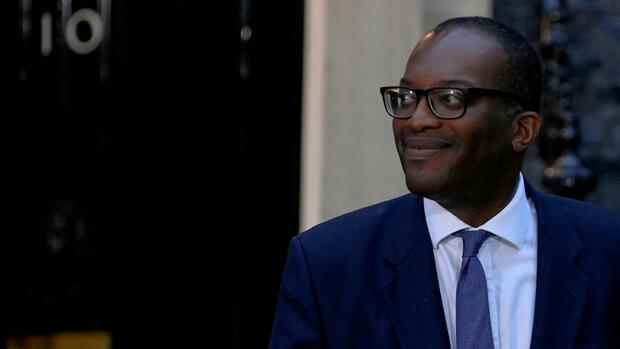London The boss’s announcement came from New York this week: Great Britain’s Prime Minister Liz Truss announced nothing less than a second “Thatcher revolution” on the sidelines of the UN General Assembly.
Following the “Iron Lady’s” textbook, Truss wants to lower taxes, relax regulations and thus boost economic growth. The new British Finance Minister Kwasi Kwarteng, who will present a supplementary budget on Friday, should ensure that the calculation works out.
Nevertheless, the conservative government in London initially wants to finance its budgetary offensive on credit. Like former US President Ronald Reagan, Truss and Kwarteng hope that additional economic growth will close the huge financial gap by itself.
A risky plan, given that the more left-liberal Institute for Public Policy Research (IPPR) has just doubted that lower corporate taxes will automatically lead to more investment and growth. As a reminder: Reagan’s calculation did not work out in the end either, but led to record budget deficits.
Many governments have stumbled over large debts
And from his doctoral thesis on economic aspects at the elite university of Cambridge, Kwarteng should know enough other examples where governments have stumbled over high mountains of debt. In order to calm nervous investors abroad, the Chancellor of the Exchequer has promised that he will act in a “fiscally responsible” manner. The pound is still at its lowest level against the dollar in almost 40 years.
Necessity welds together. It helps that Truss and Kwarteng have not only been close friends for years, their offices at the seat of government in Downing Street are right next to each other and both also live on the same street in the London district of Greenwich.
The two 47-year-olds are also siblings in spirit and, together with market-liberal like-minded comrades, already in 2012 presented a radical course book with the pamphlet “Britannia unchained” (Britain unchained), in which state tasks are given small attention and market forces are given great importance.
Kwarteng calls this “blatantly” advocating more growth. After all, he and Truss want to boost the long-term growth rate of the British economy to 2.5 percent with their supply-side reforms.
According to figures from the state statistics agency ONS, the average increase over the past five years was less than one percent. Economists are therefore skeptical that this can work.
Experts warn of rising inflation
“The supply-side interventions we need would typically take several years to have an impact,” said Jagjit Chada, director of the National Institute of Economic and Social Research (NIESR) think tank in London. “There is no magic wand to do this could happen during the legislature of this Parliament.”
It is therefore worrying that the Chancellor of the Exchequer is instead opting to temporarily boost growth through tax cuts and higher government spending, which will ultimately only stoke inflation.
However, Truss and Kwarteng remain on their growth mission. The finance minister has urged his team to focus “fully on growth”. “That means we need to cut taxes, put the money back in people’s pockets, and rid our businesses of onerous taxes and improper regulations,” he writes.
On Friday, Kwarteng therefore not only wants to reverse the increase in contributions for the state social security system (National Insurance), but also cancel the increase in corporate tax rates from 19 to 25 percent that his predecessor had planned. Income tax is also to be reduced by the next election in 2024.
Talented but strange
Neither he nor Prime Minister Truss disputes the fact that the tax breaks primarily benefit higher earners and companies. If you delete the top, everyone would benefit, so they hope. According to reports, both want to remove the state cap for bankers’ bonuses in the City of London.
For Kwarteng, being appointed finance minister is something of an unexpected political comeback. The son of Ghanaian immigrants was already on the hit list under ex-Prime Minister Boris Johnson as Minister for Economic Affairs.
He is the fourth consecutive finance minister to come from an ethnic minority background. Like Johnson, the lover of Latin poetry went to the elite Eton school and is considered to be extremely intelligent. “Kwarteng is perhaps the most intellectually gifted Chancellor of the Exchequer since Gordon Brown. In any case, he’s the strangest,” says The Economist.
That, like Truss, he is willing, if necessary, to adapt his own principles to reality, despite all his radical market rhetoric, has been shown by Kwarteng several times: he rejected criticism of his state subsidies as Economics Minister, pointing out that economic reality sometimes conflicted with “What you learn in the textbooks”. Kwarteng calls this “relentless pragmatism”. He will need a lot of that in his new position.
More: Truss promises economic freedom – but at the same time intervenes massively in the energy markets
